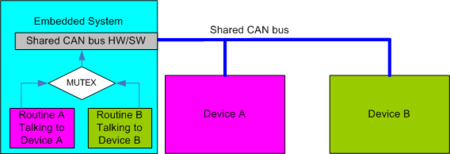Difference between revisions of "Mutex"
From Teknologisk videncenter
m (→Example) |
m (→ARM Thumb) |
||
| Line 10: | Line 10: | ||
==ARM Thumb== | ==ARM Thumb== | ||
LDREX and STREX<ref name=M3177>The definitive guide to the CORTEX-M3, Second edition - section 10.6 page 177 (ISBN978-1-85617-963-8</ref> | LDREX and STREX<ref name=M3177>The definitive guide to the CORTEX-M3, Second edition - section 10.6 page 177 (ISBN978-1-85617-963-8</ref> | ||
| + | =References= | ||
<references/> | <references/> | ||
[[Category:Embedded]][[Category:ARM]] | [[Category:Embedded]][[Category:ARM]] | ||
Revision as of 09:14, 24 March 2012
A Mutex (Mutual Exclusion) is a method used to gain exclusive rights to use a shared resource in programming. Often used when designing software in embedded systems using interrupts and/or RTOS.
Example
In a interrupt driven embedded system there are two devices connected to a CAN bus. Two independent software routines communicate independent of each other with Device A and Device B through a shared CAN bus. See drawing below.
ARM Thumb
LDREX and STREX[1]
References
- Jump up ↑ The definitive guide to the CORTEX-M3, Second edition - section 10.6 page 177 (ISBN978-1-85617-963-8
